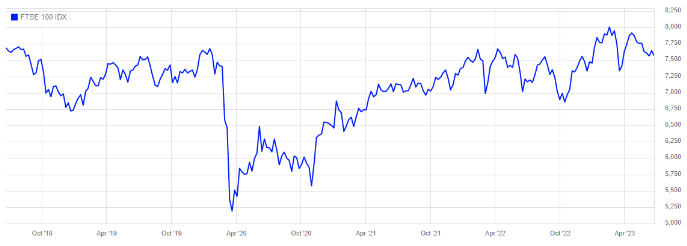
Investing often comes with its fair share of ups and downs. Whether it’s excitement about an investment opportunity, or concern about market volatility, it’s easy for your emotions to influence your financial decision-making.
While you should base your investment decisions on facts, not feelings, this is sometimes easier said than done. When your hard-earned wealth is involved, short-term fluctuations can often mean your emotions lead your financial decisions which, in turn, could hinder your progress towards your financial goals.
In fact, research reported by FTAdviser revealed that advisers believe investors’ emotion-led decision-making is costing them at least 2% each year in lost returns.
If you let your emotions play a significant role in your decision-making, you could find you make choices that don’t align with your overall financial plan. Thankfully, there are ways you can manage these emotions – read on to find out more.
Short-term market volatility could cause you to worry about the performance of your investments
When it comes to your investments, there are dozens of factors that can cause the value to rise and fall. Understandably, you may start to feel concerned during periods of uncertainty.
Take, for example, the Covid-19 pandemic. Markets around the world experienced a period of considerable decline at the start of 2020, as shown by the FTSE 100 stock market index.

Source: London Stock Exchange
As you can see, the index dropped significantly in March 2020 following government-mandated lockdowns to halt the spread of Covid. However, the index did eventually recover, reaching well above pre-Covid levels in early 2023.
It’s important to note that, had your emotions taken over and you sold your investments during the dip in March 2020, you would have likely missed the subsequent recovery when lockdowns eased.
So, overcoming negative emotions during this period could have seen the value of your portfolio recover in the medium term.
To further reinforce the idea that investing is a long-term endeavour, CNBC reports that, historically, some of the market’s most significant downturns have been followed by its greatest upswings.
Indeed, the research reveals that the market’s first and second largest rises between 2002 and 2022 were 12 October and 28 October 2008, respectively. Perhaps surprisingly, this was when the 2008 financial crisis was in full swing following the collapse of the Lehman Brothers investment bank.
Likewise, the market’s third best day was 24 March 2020, a time when economies around the world started entering lockdowns.
Overcoming common emotional reactions to market uncertainty can help you to remain on course and expose your wealth to potential growth when markets recover which, historically, they have tended towards.
There are some emotional cognitive biases that can affect your investment decisions
It’s important to remember that there are also many cognitive biases that could hamper your progress towards your goals if you impulsively act on them. Here are three.
Trend chasing
As the name suggests, trend chasing – or “herd mentality” bias – is where you follow the crowd in search of quick returns.
However, it’s worth remembering that the past performance of an investment is no guarantee of future success, and you could hinder the growth of your investments if you don’t follow this advice.
Perhaps the most memorable example of this cognitive bias involves GameStop in early 2021. The Guardian states that the company’s share price rose by 1,700% as many investors followed a trend and bought into the company with hopes of high returns.
The bubble eventually burst, and many investors lost a sizeable portion of their investment. We can work with you to create your own financial plan, and help you to stick to it rather than following the crowd.
Loss aversion
Simply put, “loss aversion” is the idea that humans feel the pain of losses twice as strongly as the pleasure on an equivalent gain.
It’s easy to feel as though a gain was inevitable and you may quickly move onto your next investment opportunity. Though, when you make a loss, you could take this personally and subconsciously attempt to avoid it from this point on.
This could lead to an inconsistent investing strategy, as you may become too risk-averse in the hope of avoiding the “stress” of loss. By not taking on enough risk, you could fail to achieve the level of growth needed to reach your financial goals.
Confirmation bias
Perhaps one of the most common emotional biases, “confirmation bias” involves making important decisions based on your pre-established assumptions rather than factual evidence.
This is understandable, as humans have the tendency to look for information that reaffirms the beliefs they hold. In investing, this can sometimes affect your overall strategy.
For example, if you believe a particular asset will rise in value, you may be subconsciously drawn to information that validates this belief. On the other hand, you may also ignore evidence that goes against this belief.
As you can imagine, this could have a significant negative effect on your investment strategy and the performance of your assets.
Get in touch
One of the benefits of working with a financial planner is that we can act as a “sounding board”, helping you to avoid knee-jerk decisions that could negatively affect your wealth.
What’s more, we can help you build a bespoke financial plan and a balanced portfolio that matches your appetite for risk, giving you peace of mind on every step of your investing journey.
To find out how we could help, please contact us via email at info@investmentsense.co.uk or call 0115 933 8433.
Please note
Your capital is at risk. The value of your investments (and any income from them) can go down as well as up and you may not get back the full amount you invested. Past performance is not a reliable indicator of future performance. Investments should be considered over the longer term and should fit in with your overall attitude to risk and financial circumstances.



